Analysis: How farming will gain from new agri-tech solutions
UK agriculture faces a period of uncertainty, with the removal of direct support payments, volatile markets and tight margins leaving many farmers out of pocket.
At the same time, food production will need to increase to support an ever-growing population.
FW’s business reporter Charlie Reeve looks at a range of innovations being developed that could support the farming industry in the face of these challenges.
Epiherd: Testing gene make-up to improve breeding
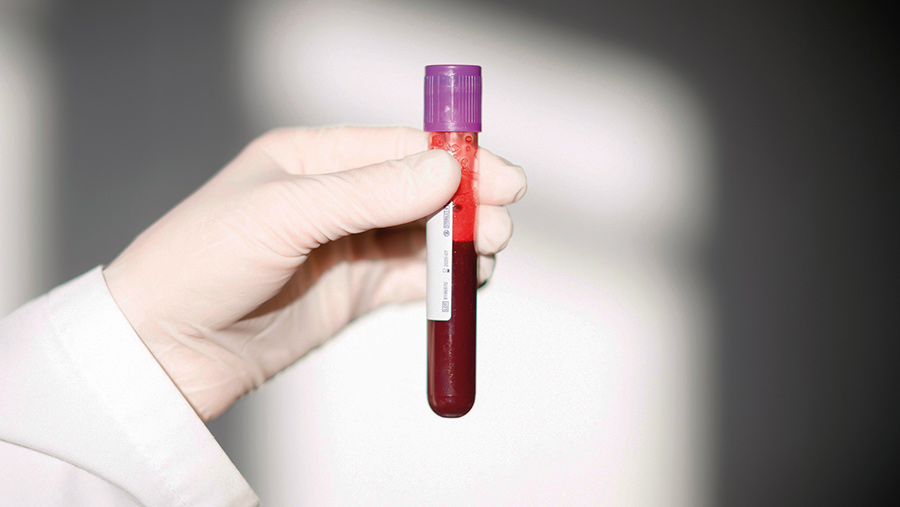
© Antler Bio
Epiherd, being developed by Irish company Antler Bio, tests which genes are active in a specific animal and uses this knowledge to inform breeding decisions.
It is currently being used in dairy herds to study each animal’s genetics, looking at different genomic expressions to see which animals have the most useful active genes.
Farmers will then be able to view the Epiherd platform to compare cows and see top producing animals, viewing the different scores related to traits such as milk yield, fat and protein content, immunity, and environmental impact.
The current system requires a blood sample from each animal to be tested. In the future, tests should also be possible using milk samples, providing a more cost-effective and non-invasive approach.
Antler Bio is working with the Centre for Innovation Excellence in Livestock (Ciel) to test the Epiherd platform on farms in the UK and provide actionable insights for farmers based on the results.
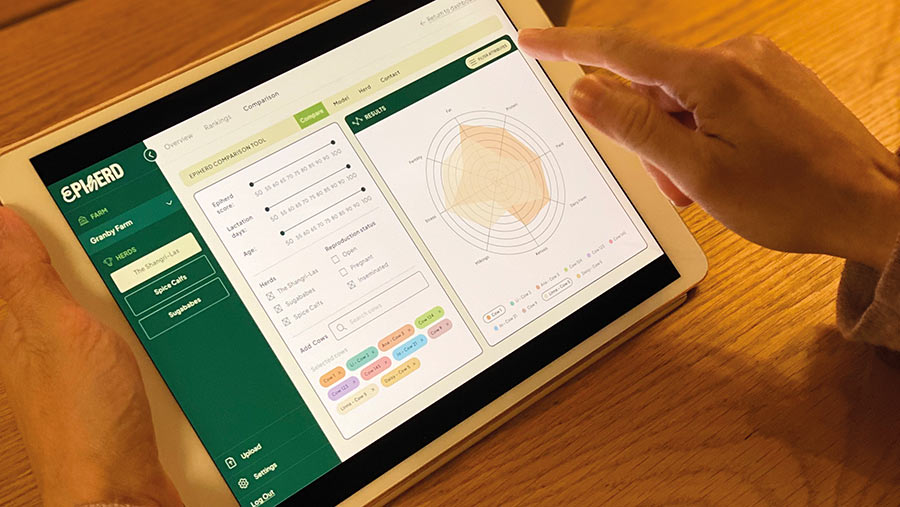
© Antler Bio
Maria Jensen, Antler Bio’s founder and chief executive, says: “There is nothing like this yet in the livestock sector and we are the first company to bring this data on gene expressions to the farmer.”
The plan is to expand the current platform to beef cattle and to other species such as pigs in the coming years, according to Ms Jensen.
“For the next two years, we are going to be doing research and product development, and we then will be ready to launch Epiherd for any farmer to buy,” she adds.
“However, the farms we are working with now are already getting advantages from the data. We are looking at expanding the number of farms we are working with in Finland, the UK and Ireland.”
LettUs Grow: Producing crops without soil
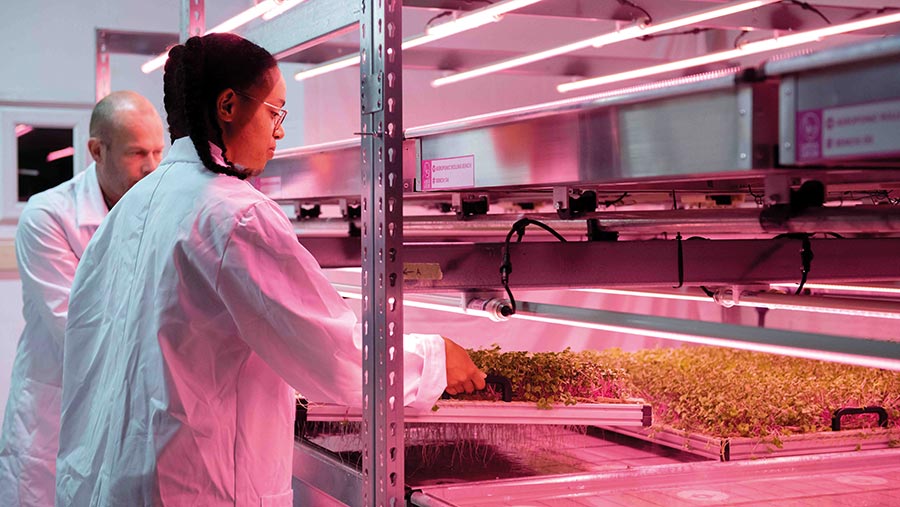
© LettUs Grow
Bristol-based startup LettUs Grow designs and builds aeroponic technology for vertical farms and greenhouses.
In aeroponics, the growing plants are suspended in the air, giving the roots more access to oxygen. The plants are irrigated using a nutrient-dense mist.
By allowing the plants’ roots to access more oxygen, crops are able to achieve faster growth rates and improved yields.
The mist is created using ultrasonic waves, which produce much finer droplets than a standard spray nozzle.
The technology has the ability to be rolled out to larger growers such as large vertical farms, greenhouses and polytunnels using aeroponic rolling benches.
Ben Crowther, the company’s co-founder and chief technical officer, says: “Aeroponic systems improve productivity and reduce water consumption per kilogram of produce grown.
“So it made sense for us to apply this in the environment where these enhancements can have the most impact – and that’s in hectare-scale greenhouse and vertical farm production.
“Aeroponic rolling benches allow us to do this without re-designing the farm, so we can bring these benefits to new projects and existing facilities.”
Mr Crowther adds: “By using aeroponics, growers are able to produce crops such as leafy greens and herbs, and propagate different crops such as fruits, all year round with a greatly reduced risk of damage by pests or disease.
“Although more energy is required compared to outdoor agriculture, aeroponic farmers can use a combination of renewable energy sources to mitigate rising energy costs.”
CattleEye: Watching out for lameness in cattle
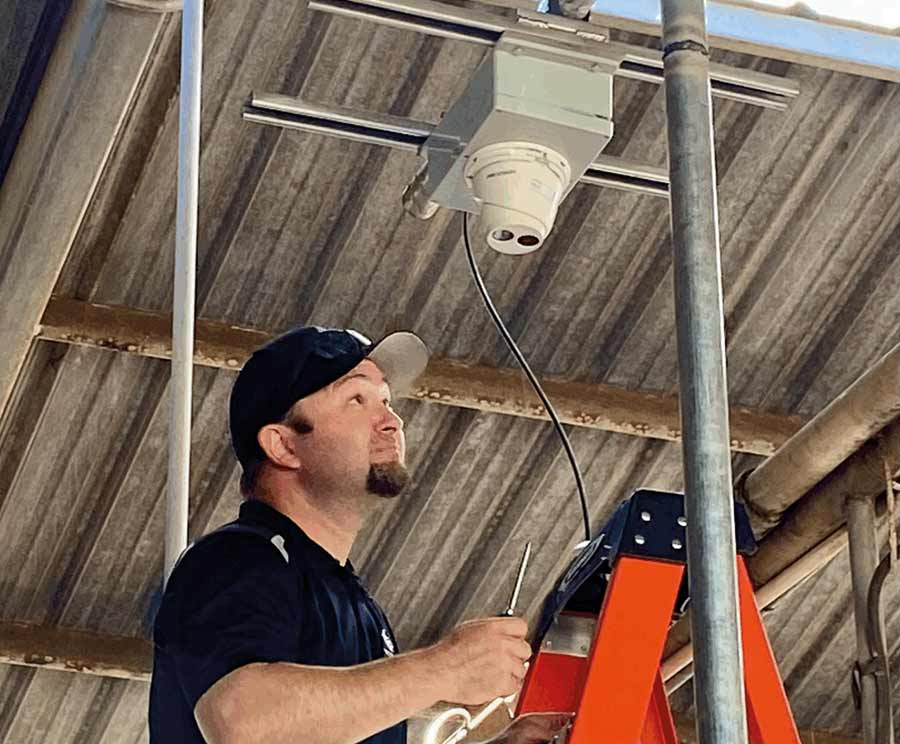
© CattleEye
Designed to spot lameness in cattle as early as possible, CattleEye uses cameras and artificial intelligence to constantly monitor and analyse animal movements.
A camera is mounted to the roof or wall of a passage where cattle frequently walk, such as at the entry or exit of a milking parlour.
The camera is constantly recording, using electronic identification tags to film individual cows as they walk under the camera, and footage is then uploaded to the cloud.
Artificial intelligence (AI) is used to build up a profile of each cow by looking at key points on the animal over time to detect changes in its mobility.
As soon as the algorithm notices a change in the way a cow is walking, it can be reported to the farmer, often detecting lameness days or even weeks before it would normally be noticeable.
The software is also able to create a mobility score and a body condition score for each animal, allowing it to spot other issues such as changes in conformation.
CattleEye, which was founded in 2019 by Terry Canning, the son of a dairy farmer from Northern Ireland, and architect Adam Askew, is piloting the system on about 20 farms in the UK and a further 15 across Europe and America, focusing on larger dairy units in particular.
It is also working with major retailers including Tesco, Sainsbury’s and Marks & Spencer to help improve animal welfare on farm by reducing lameness, and has recently signed up a number of paying customers.
Ekogea: Seaweed extract to boost daily liveweight gains
Agri-tech business Ekogea has developed a feed ingredient that is said to produce noticeable productivity gains for poultry and pig producers.
BioComplex contains polyuronic acid and oligosaccharides (basic sugars) extracted from raw seaweed sourced from the Outer Hebrides. It is added to feed at a rate of about 500g to 1kg a tonne.
On-farm studies for poultry and pigs have found that it can increase daily liveweight gains, improve feed conversion efficiency and improve overall animal health.
Mike Clarke, head of animal health at Ekogea, says: “If you were to feed that to a pig, cow, or chicken, it works as a pre-biotic, working in the lower intestine.
“The sugars feed bugs generically, so you have a huge increase in the number and diversity of organisms in the lower gut, while the polyuronic acid has lots of negative ions.
“That does two things: first, it alters which of those bugs get the benefit; second, it swings the balance of the bugs in the lower gut by competitive exclusion, towards the ones you want to be there.
“Those beneficial bugs improve the availability of nutrients in the lower gut, so more nutrients are available to be absorbed. That means there is extra energy available from a normal kilo of food.”
Mr Clarke says the product also helps to reduce ammonia emissions, creating a healthier environment for the animals and producing a more environment-friendly slurry.
Pig farmers have also reported reduced aggression in pigs being fed the product, he says, and increased nitrogen levels in muck.
Ongoing work is being carried out to establish benefits for other sectors from using the feed ingredient, such as better growth rates in beef and improved milk yields in dairy.
Agrointelli Robotti: Autonomous lightweight tractors
Danish manufacturer Agrointelli has developed its Robotti range of autonomous tractors that can reduce labour, limit soil compaction and lower operating costs.
Robotti tractors have been trialled with a range of crops, including potatoes, onions, oilseed rape and vegetables.
They have two diesel engines, four-wheel drive and a standard three-point linkage. Fuel consumption is low at three to six litres/hour.
The Robotti weighs roughly 3t, making it lighter than a conventional tractor.
The company has been focusing initially on sales in Europe and North America, although has begun expanding into the UK market and is working with Warwickshire-based sales and service provider Autonomous Agri Solutions.
Bennamann: Capturing methane to power the farm
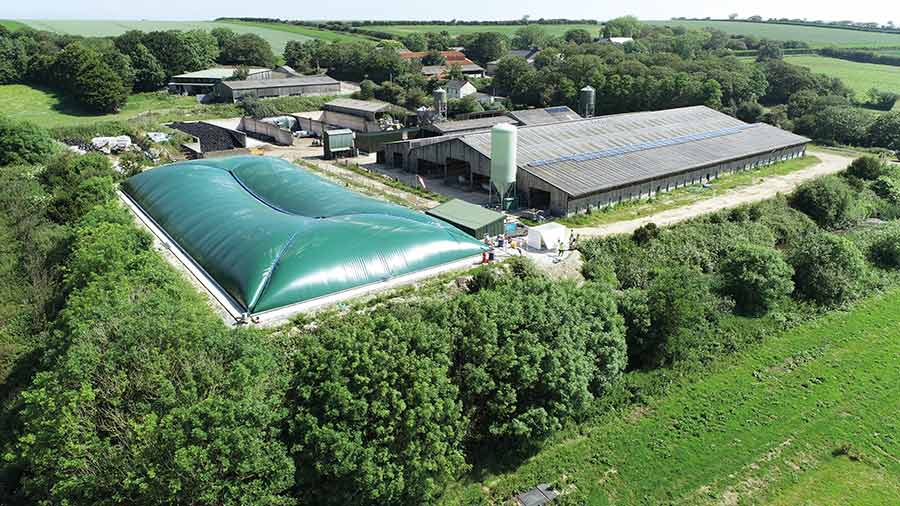
© Bennamann
Cornish biofuels company Bennamann is delivering a solution to reduce methane emissions on farm and repurpose it for energy use.
The technology works by capturing methane from manure slurry lagoons using impermeable covers, predominantly on dairy farms.
Pollutants are filtered out using a fixed on-site plant room, and a mobile processing unit then converts the remaining biogas to biomethane in liquid or compressed gas form.
This product can then be used as an alternative fuel for vehicles, electricity generation and heating.
CNH Industrial, which includes brands such as Case IH and New Holland, has been investing in Bennamann since 2019 and recently acquired a controlling stake.
Derek Neilson, president of agriculture at CNH Industrial, says that by consolidating its share in Bennamann, it can offer customers a full energy production, storage and distribution service.
“This solution can transform farms into mini energy hubs that can satisfy their own energy needs, produce their own natural fertiliser, and sell any excess gas on the open market,” he says.
“It also enables them to generate their own electricity. This makes us a true alternative energy enabler, able to serve myriad applications and contribute to a carbon-negative future.”
CNH Industrial recently released a prototype of its New Holland T7 Methane Power tractor.
CropLens AI: Crop management from space
UK-based Agrimetrics has launched an artificial intelligence service called CropLens AI that can identify and analyse crops using satellite imaging.
It has been found to provide up to 90% accuracy, depending on the time of year, and can identify five crop types: winter wheat, winter barley, oilseed rape, grass and “other”.
With data updated every six days, farmers can use the data to know where to irrigate, when to apply nitrogen, predict yields, and predict pest and disease damage.
Matthew Smith, Agrimetrics’ chief product officer, says: “Real-time, accurate and reliable knowledge of what’s happening on the ground and why, is now a critical success factor for actors across the agrifood value chain.
“Agrimetrics CropLens AI and the Agrifood Data Marketplace are making it easier, faster, and more affordable to generate actionable insights earlier in the season.”
Agri-tech hubs driving the future of farming
The UK agri-tech industry is estimated to be worth £14bn, according to industry figures, and it continues to grow.
Funding of £90m was provided by Innovate UK to help four dedicated agri-tech centres harness UK research expertise, as well as build new infrastructure and encourage innovation. These are:
- Agri-EPI Centre (engineering and precision technologies)
- Crop Health and Protection (Chap)
- Centre for Innovation Excellence in Livestock (Ciel)
- Agrimetrics
The centres have been involved with more than 500 projects to date with a combined value of more than £80m, and have a projected return on investment to the UK economy of 13:1.
Ciel is helping to support industry-led research into new agri-tech solutions for the livestock sector.
Phil Bicknell, Ciel’s head of business development, says: “We have done a couple of rounds of seed funding, providing small amounts of money that businesses can tap in to, that we’ll match fund for them to carry out research, typically around the £50,000 mark.”
Growth area
South-west England is proving to be a key growth area, with agri-tech businesses in the region having an estimated combined turnover of about £371m a year.
Joanna Rufus, chair of South West Agri-tech, said: “We have over 200 small- to medium-sized agri-tech companies and 64 business support organisations, including centres of excellence.”
An event is taking place on 20 April at Exeter Racecourse, showcasing agri-tech start-ups in the region.
Another agribusiness incubator is Farm 491, based at the Royal Agricultural University in Gloucestershire, which is home to a number of start-ups and regularly runs networking events for the industry.
